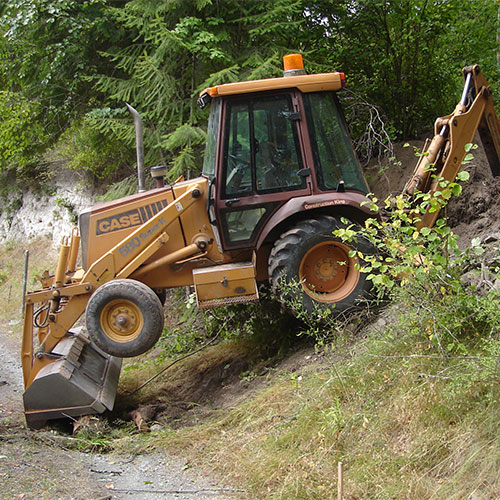Lancaster Trenching - Professional Trenching Solutions in Lancaster, Ohio
Lancaster Trenching - Professional Trenching Solutions in Lancaster, Ohio
Blog Article
Comprehensive Excavation Strategies: Grasping the Fundamentals for Success
The careful planning, precise implementation, and careful interest to detail required in excavation projects require a thorough strategy that incorporates numerous essential elements. The true proficiency exists not simply in comprehending these fundamentals however in perfectly integrating them to browse the intricacies of excavation projects with finesse.
Understanding Excavation Task Preparation

Effective excavation projects are improved the structure of careful and comprehensive preparation. The preliminary stage of any type of excavation task is the preparation stage, where essential choices are made that can substantially impact the end result of the task. During this stage, it is necessary to gather all relevant details concerning the site, consisting of topographical studies, soil structure, and any kind of prospective hazards that might exist. Comprehending the task extent, budget, and timeline restraints is essential for developing a detailed excavation strategy that makes certain the project's success.
One key aspect of excavation job planning is the development of a thorough timeline that details the sequence of deadlines, landmarks, and activities. By carefully thinking about all these elements throughout the planning phase, excavation projects can be executed effectively and effectively, leading to successful outcomes - excavating ohio.
Dirt Evaluation and Site Analysis
Conducting complete dirt analysis and site examination is a crucial action in the prep work phase of any type of excavation job. Dirt evaluation entails identifying the structure, framework, and homes of the dirt at the excavation website. This details is vital for understanding the soil's bearing capability, wetness material, and potential for erosion, which are crucial consider establishing the excavation methods and equipment needed for the job.
Site examination exceeds dirt evaluation and encompasses a wider assessment of the overall site problems. This evaluation includes identifying any kind of possible risks, such as underground energies, environmental concerns, or unstable terrain, that can affect the excavation procedure. By extensively reviewing the site, task managers can establish reliable excavation approaches that prioritize security, performance, and ecological defense.
Making use of innovative technologies like ground-penetrating radar, dirt sampling, and drone surveys can boost the precision and efficiency of dirt evaluation and website analysis. Spending time and sources in these initial steps can ultimately save time and avoid costly hold-ups or issues during the excavation process.
Equipment Selection and Application
Reliable excavation tasks depend heavily on critical equipment selection and utilization to ensure optimal efficiency and efficiency. Choosing the best equipment for the job is important in making best use of performance and decreasing downtime. Aspects such as the type of soil, deepness of excavation, and job range play a significant function in identifying one of the most suitable tools for the task handy.

Along with selecting the ideal tools, correct application is essential to job success. Operators has to be educated to handle the equipment safely and successfully - dump truck companies in ohio. Normal upkeep checks and timely repair services assist stop failures and make certain regular performance throughout the job
Precaution and Laws Compliance
In the realm of excavation tasks, focusing on security procedures and compliance with regulations is paramount to making certain a legally audio and protected operational atmosphere. Safety and security procedures encompass a range of practices, consisting of conducting thorough website evaluations, executing proper signs and you could look here obstacles, and offering adequate safety and security training for all workers associated with the excavation process. Adherence to regulations, such as OSHA needs in the United States, guarantees that the excavation project fulfills the required criteria to safeguard employees, bystanders, and the surrounding environment.

Monitoring Progression and Adjusting Approaches
Exactly how can project managers properly track the development of excavation tasks and adapt their methods accordingly to enhance end results? Tracking progression is important for ensuring that excavation projects stay on track and satisfy target dates.

Final Thought
To conclude, understanding the fundamentals of detailed excavation methods is vital for the success of any kind of project. By comprehending project planning, evaluating dirt and site conditions, picking ideal devices, following safety and security policies, and monitoring development, project supervisors can Check Out Your URL ensure a smooth and reliable excavation procedure. Executing these approaches will bring about successful end results and reduce possible dangers or problems during the excavation job.
The first phase of any kind of excavation project is the planning phase, where vital decisions are made that can considerably affect the result of the task. Understanding the job budget, scope, and timeline constraints is important for developing an extensive excavation strategy that ensures the project's success.
How can project supervisors effectively track the improvement of excavation jobs and adjust their approaches accordingly to optimize results? By carefully keeping an eye on progress and being ready to adjust approaches, task managers can enhance the total success of excavation jobs.
By recognizing project preparation, evaluating dirt and website conditions, picking appropriate devices, complying with security laws, and keeping track of progress, project managers can make certain a smooth and effective excavation process.
Report this page